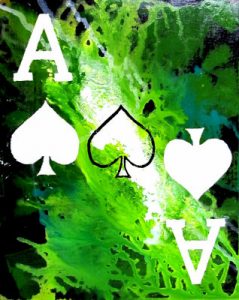 The moment (which can be either positive or negative) is one of those intuitive words that has escaped definition in the poker world but is often used. How exactly could we define it?
The moment (which can be either positive or negative) is one of those intuitive words that has escaped definition in the poker world but is often used. How exactly could we define it?
In previous articles, we concluded that the flow of the game is specifically a human phenomenon, but is the moment as well? Maybe the moment is a product of our imagination, a psychological construct, or is it a real thing established in this game? Would a computer experience an instant psychological advantage while playing poker?
Imagine that we have lost two buy-ins, and on the river, we are being barreled for the third time. We missed the draw, so we think for a while and fold. The opponent thinks and doesn't show the cards. Now we have lost three buy-ins and, as one might expect, we feel the loss, while our opponent has experienced the moment.
How exactly does it arise in this example? Undoubtedly, the biggest part comes from our emotional reaction. Even the best players in the world would have at least a small emotional response in such a situation.
Let's consider another experiment. Imagine that we have no emotional response in this hand. Let's completely cut out the emotional element by saying that a family hermit has just left you ten million dollars in a will, so you shouldn't care at all about the three lost buy-ins, you have just become a multi-millionaire. Money is completely irrelevant at this moment.
The opponent goes all-in, you think for a long time and fold, the cards are not revealed. How about now? Is the negative moment still here? Do you still feel it?
I guess so. Even if you don't feel psychological pain, you still feel like you are behind the opponent. You feel the negative moment.
If this is true, the moment should be more than just an emotion. It can be concluded that, like with emotional dynamics, the opponent's expectations affect the flow of the game just as much as the emotions themselves. So, if your opponent expects you to be “behind,” you have to react to that expectation – that's what the moment is about.
The opponent's expectation that you will feel emotions arises from not entirely accurate information – the opponent makes assumptions about you, even though they don't know you personally. But let's say you are playing with someone who knows that you just received ten million dollars, so they know that the three buy-ins don't affect you emotionally. Is the moment still here? Close your eyes and imagine. They know how much money you have, they go all-in, you think for a long time and fold.
Is your game still behind? Yes, it is still behind the opponent. So, what then creates the moment?
Some people imagine that the moment is an error in the gambler's mind, but it is not quite so. The real answer is a bit more subtle.
so. The real answer is a bit more subtle.
When, after thinking for a long time, you folded on the river, missing the draw and not seeing what the opponent had, the feeling that arose was more than just an emotional sting. At the same time, you created informational asymmetry. In other words, the opponent gained more information than you did. From the fact that you thought and folded, they know that you were considering a hero call but chose to fold instead. From this information, they can reconstruct your playing style and strategy. And you don't know if they were bluffing or not, so you gathered only a small part of the information, while the opponent got a lot. This is informational asymmetry. And it is a significant reason why, even when experiencing a negative moment and removing emotions, you still remain behind the opponent.
Of course, there are also common negative moment situations that do not have informational asymmetry. A good example of this is a big hero call. Suppose you are bluffing on a board where the draw missed, and your opponent snap-calls on the river with a bottom pair. They learned the lesson that you shove on the river with nothing, but you also have the information that the opponent calls with anything and clearly doesn't believe you. So, although you lost a buy-in in this situation, you gained valuable insight that you need to tighten up against this opponent and not bluff in such situations.
This is an example of a psychologically induced moment. But again, in real matches, the negative moment will still remain, partly due to the emotional reaction. However, it can also remain because you don't trust your ability to “read” the opponent.
The moment is real and is caused by more than one sensation, so you shouldn't feel bad if you stop playing after noticing a negative moment. Simply stopping the match and starting a new one after some time can allow you to start fresh with informational equality. There are plenty of fish in the sea, so there are many matches you can play, so if you feel the moment is not right, stop playing.





